高考英语牛津英语虚拟语气
- 格式:ppt
- 大小:1.26 MB
- 文档页数:18
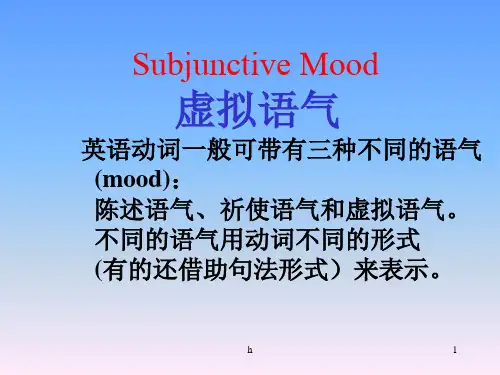
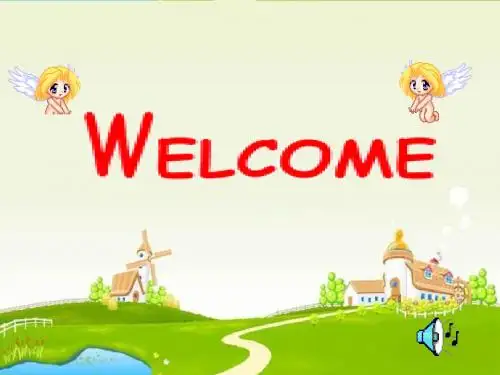

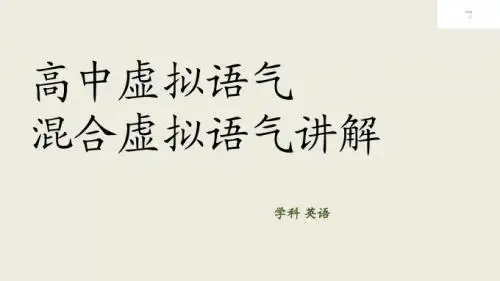
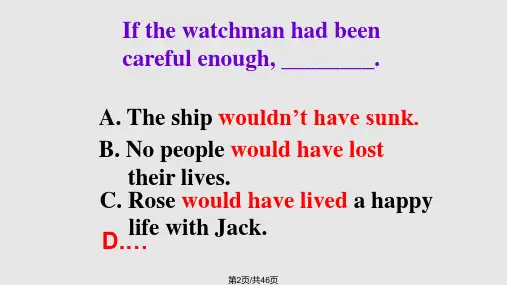
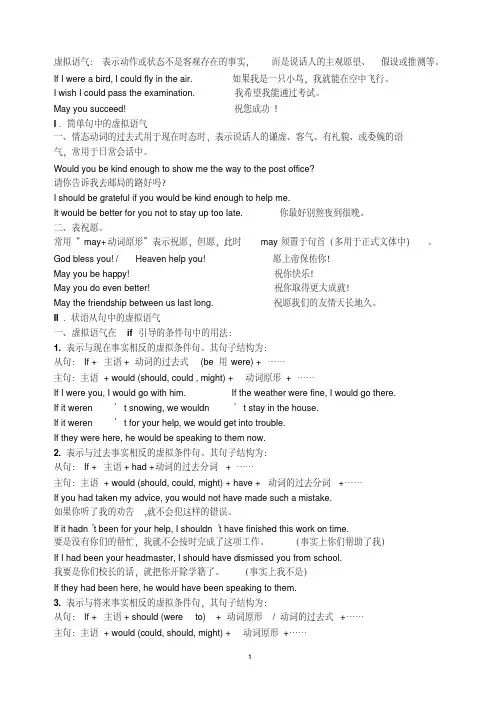
虚拟语气:表示动作或状态不是客观存在的事实,而是说话人的主观愿望、假设或推测等。
If I were a bird, I could fly in the air. 如果我是一只小鸟,我就能在空中飞行。
I wish I could pass the examination. 我希望我能通过考试。
May you succeed! 祝您成功!I.简单句中的虚拟语气一、情态动词的过去式用于现在时态时,表示说话人的谦虚、客气、有礼貌、或委婉的语气,常用于日常会话中。
Would you be kind enough to show me the way to the post office?请你告诉我去邮局的路好吗?I should be grateful if you would be kind enough to help me.It would be better for you not to stay up too late. 你最好别熬夜到很晚。
二、表祝愿。
常用“may+动词原形”表示祝愿,但愿,此时may须置于句首(多用于正式文体中)。
God bless you! / Heaven help you! 愿上帝保佑你!May you be happy! 祝你快乐!May you do even better! 祝你取得更大成就!May the friendship between us last long. 祝愿我们的友情天长地久。
II.状语从句中的虚拟语气一、虚拟语气在if 引导的条件句中的用法:1. 表示与现在事实相反的虚拟条件句。
其句子结构为:从句:If + 主语+ 动词的过去式(be 用were) + ……主句:主语+ would (should, could , might) + 动词原形+ ……If I were you, I would go with him. If the weather were fine, I would go there.If it weren’t snowing, we wouldn’t stay in the house.If it weren’t for your help, we would get into trouble.If they were here, he would be speaking to them now.2. 表示与过去事实相反的虚拟条件句。
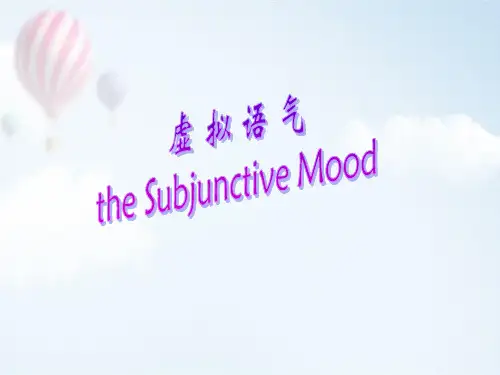
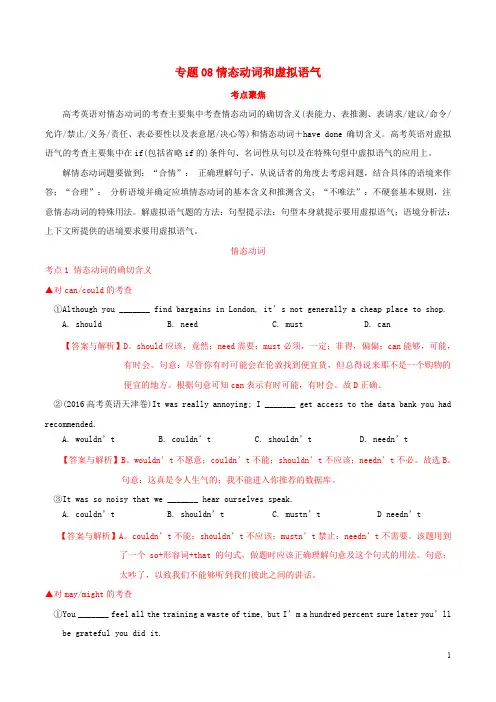
专题08情态动词和虚拟语气考点聚焦高考英语对情态动词的考查主要集中考查情态动词的确切含义(表能力、表推测、表请求/建议/命令/允许/禁止/义务/责任、表必要性以及表意愿/决心等)和情态动词+have done确切含义。
高考英语对虚拟语气的考查主要集中在if(包括省略if的)条件句、名词性从句以及在特殊句型中虚拟语气的应用上。
解情态动词题要做到:“合情”:正确理解句子,从说话者的角度去考虑问题,结合具体的语境来作答;“合理”:分析语境并确定应填情态动词的基本含义和推测含义;“不唯法”:不硬套基本规则,注意情态动词的特殊用法。
解虚拟语气题的方法:句型提示法:句型本身就提示要用虚拟语气;语境分析法:上下文所提供的语境要求要用虚拟语气。
情态动词考点1 情态动词的确切含义▲对can/could的考查①Although you _______ find bargains in London, it’s not generally a cheap place to shop.A. shouldB. needC. mustD. can【答案与解析】D。
should应该,竟然;need需要;must必须,一定;非得,偏偏;can能够,可能,有时会。
句意:尽管你有时可能会在伦敦找到便宜货,但总得说来那不是一个购物的便宜的地方。
根据句意可知can表示有时可能,有时会。
故D正确。
②(2016高考英语天津卷)It was really annoying; I _______ get access to the data bank you had recommended.A. wouldn’tB. couldn’tC. shouldn’tD. needn’t【答案与解析】B。
wouldn’t不愿意;couldn’t不能;shouldn’t不应该;needn’t不必。
故选B。
句意:这真是令人生气的;我不能进入你推荐的数据库。

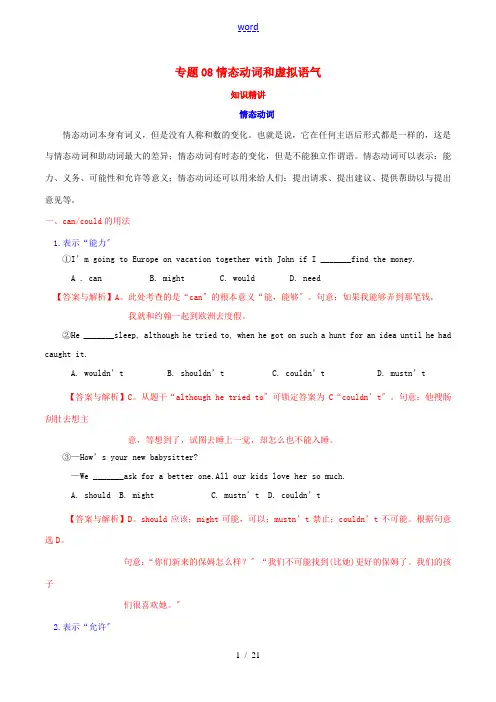
专题08情态动词和虚拟语气知识精讲情态动词情态动词本身有词义,但是没有人称和数的变化。
也就是说,它在任何主语后形式都是一样的,这是与情态动词和助动词最大的差异;情态动词有时态的变化,但是不能独立作谓语。
情态动词可以表示:能力、义务、可能性和允许等意义;情态动词还可以用来给人们:提出请求、提出建议、提供帮助以与提出意见等。
一、can/could的用法1.表示“能力〞①I’m going to Europe on vacation together with John if I _______find the money.A . can B. might C. would D. need【答案与解析】A。
此处考查的是“can〞的根本意义“能,能够〞。
句意:如果我能够弄到那笔钱,我就和约翰一起到欧洲去度假。
②He _______sleep, although he tried to, when he got on such a hunt for an idea until he had caught it.A. wouldn’tB. shouldn’tC. couldn’tD. mustn’t【答案与解析】C。
从题干“although he tried to〞可锁定答案为C“couldn’t〞。
句意:他搜肠刮肚去想主意,等想到了,试图去睡上一觉,却怎么也不能入睡。
③—How’s your new babysitter?—We _______ask for a better one.All our kids love her so much.A. shouldB. mightC. mustn’tD. couldn’t【答案与解析】D。
should应该;might可能,可以;mustn’t禁止;couldn’t不可能。
根据句意选D。
句意:“你们新来的保姆怎么样?〞“我们不可能找到(比她)更好的保姆了。
我们的孩子们很喜欢她。

英语语法(牛津版)第二十八章虚拟语气290形式A 虚拟现在时形式与不带to的不定式完全相同;因此be的虚拟现在时形式不分人称均为be,所有其他动词的虚拟现在时其形式均与其一般现在时形式相同,只是第三人称单数不加s:The queen lives here.女王住在这里。
(一般现在时)Long live the queen!女王万岁!(虚拟语气)B 除be动词之外,虚拟过去时形式与一般过去时形式完全相同,而be的虚拟过去时形式为I/he/she/it was或 I/he/she/itwere。
表示怀疑或不真实的结构中,常常用were而不用was:He behaves as though he were the owner.他表现得就好像他是主人。
(其实他不是。
)在日常口语中,常常用was来代替were。
(参见第225节。
)虚拟的过去常常被称为“不真实的过去”。
291 虚拟现在时的用法A 虚拟现在时常用在某些惊叹句中,表示一种祝愿或希望,时常是牵涉到某种超自然的力量:(God) bless you!愿上帝保佑你!God save the queen!愿上帝保佑女王!Heaven help us!老天保佑我们!Curse this fog!这该死的雾!Come what may,well stand by you!不管发生什么事,我们都将站在你一边!请注意if need be这一短语的用法,它的含义相当于if it isnecessary(如果有必要的话):If need be we can always bring another car.如果有必要的话我们还可以再开一辆车来。
B 虚拟现在时有时用在诗歌中,或者表示某种愿望,或者用在条件从句或让步从句中:Stevenson:Fair the day shine as it shone in my childhood.史蒂文森:但愿阳光就像我童年时代那么灿烂。
牛津高中英语虚拟语气的全部考点和记忆技巧-CAL-FENGHAI.-(YICAI)-Company One1虚拟语气的基本内容【开头引入】If 如果 (如果有两种可能,有可能发生的,不可能发生的。
)①有可能发生If it rains tomorrow, I will not go to the park.②不可能发生虚拟语气,例如,如果我是姚明,。
虚拟语气表示说话人的愿望,假设,猜测或建议,而不表示客观存在的事实。
所以,凡表示与事实不符的假设,想象,愿望时,需用虚拟语气表达。
一、If 引导的虚拟(一)If 引导的虚拟语气,可用下表表示。
例如:①与现在事实相反:If I had wings, I would fly over the sea.②If she were rich, she would buy a bigger house.If there were no gravity, we would not be able to walk on the earth.②与过去事实相反:If You had gone to the party, You would have seen YaoMing.If you had taken my advice, you would not have failed in the exam.③与将来事实相反:If he were to tomorrow, We would have the meeting.If he should come tomorrow, We could go to the park together.If there were a heavy snow next Monday, we would not go skating.(二)if虚拟语气条件句的省略倒装。
如果虚拟条件从句中有were, had, should,可把if 省略,把were, had, should 提到主语前面,成为倒装结构。
高中英语语法讲解:虚拟语气一、概述:1.虚拟语气用来表示一个说法并非真实情况,而是说话人的想象假设或主观建议。
2.与虚拟语气相对应的是陈述语气,表示该说法是真实的,符合现实的,用于陈述句、疑问句、感叹句等。
3.虚拟语气的构成有两种:(1) (should) do(2) 时态倒退与现在事实相反:一般现在时do→一般过去时did;be动词(am/is/are) 都变were与将来事实相反:一般将来时will do→过去将来时would do与过去事实相反:一般过去时did→过去完成时had done二、使用虚拟语气的11种情况1.表示“建议、命令、要求、坚持”的词+ should 虚拟语气, 表示“应该做某事”,should 可省略。
常见此类单词有:suggest/suggestion, advise/advice, recommend/recommendation, propose/proposal, order/command/demand, urge, require/request, insist等。
He made a suggestion that TV series (should) not take up too much of students' time.It was demanded that a doctor (should) be called in immediately to save the general's life.注:(1) suggest意为“暗示、表明”(2) insist意为“坚持说、坚持认为”时,后加陈述语气,表示真实情况。
What he said suggested that he wasn’t in favor of watching too much TV.She insisted that she was (be) right and (should) not be punished (not punish).2.在句型It's important/vital/necessary/essential/natural/a pity/shame/strange/... that...中用should虚拟语气,表示“应该/竟然做事某”,should一般不省。